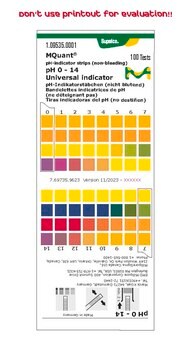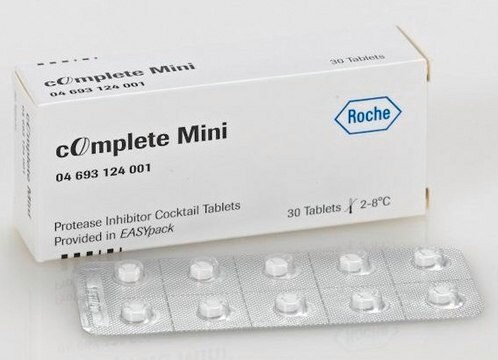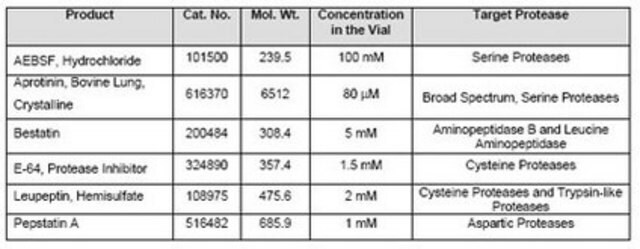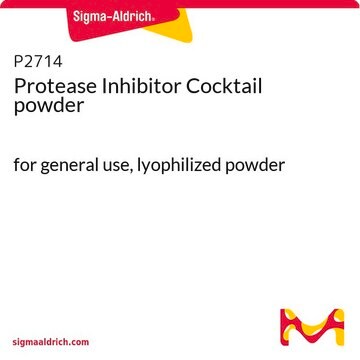COEDTAF-RO
Roche
cOmplete™, EDTA-free Protease Inhibitor Cocktail
Tablets provided in glass vials
About This Item
Recommended Products
form
tablet
packaging
vial of 20 tablets (11873580001)
vial of 3 × 20 tablets (05056489001)
manufacturer/tradename
Roche
solubility
aqueous buffer: soluble
absorption
0.08 at 280 nm
storage temp.
2-8°C
General description
Due to the optimized composition of the tablets, they show excellent inhibition of serine and cysteine proteases, and are well suited for the protection of proteins isolated from animal tissues, plants, yeast, and bacteria. cOmplete, EDTA-free tablets, contains both irreversible and reversible protease inhibitors. Metallo- and aspartic proteases are not inhibited.
cOmplete EDTA-free Tablets are identical to cOmplete Tablets, the only difference being that no EDTA or other chelating (e.g. EGTA) agents are included.
Specificity
Application
- immunoprecipitation lysis buffer (IPLS) for lysis of human embryonic kidney cells 293 (HEK293T cells) for glutathione co-precipitation
- radioimmunoprecipitation assay (RIPA) buffer for lysis of cells for western blotting
- buffer A for the lysis of bacterial cells
cOmplete, EDTA-free Tablets, are used for the inhibition of proteolytic activity in large volumes (up to 50 ml) in which EDTA may interfere with protein stability (e.g., metal-containing proteins) or subsequent assays. Since EDTA interferes with IMAC (Immobilized Metal Affinity Chromatography), cOmplete, EDTA-free, is preferentially used in the isolation process of Poly-His-tagged fusion proteins.
If it is necessary to inhibit proteolytic activity in a smaller volume (up to 10 ml), we recommend to use cOmplete, Mini, EDTA-free.
Features and Benefits
- Easy-to-use: Simply drop a quick-dissolving tablet into your buffer.
- Complete protection: Instantly protect your proteins against a broad range of proteases.
- Flexible: Protect proteins in extracts from almost any tissue or cell, including animals, plants, yeast, bacteria, or fungi.
- Safe: Choose non-toxic inhibitors that pose no risk to you or those around you.
Components
Quality
Physical form
Preparation Note
Working solution: Preparation of Working Solution
One cOmplete EDTA-free Protease Inhibitor Tablet is sufficient for the inhibition of the proteolytic activity in 50 ml extraction solution. When very high proteolytic activity is present, one tablet should be used for 25 ml extraction buffer. Tablets can be added directly to the extraction medium. Alternatively, a stock solution (25 X conc.) can be prepared.
Preparation of Stock solution (25 X conc.)
Dissolve one cOmplete EDTA-free tablet in 2 ml dist. water or in 2 ml 100 mM phosphate buffer, pH 7.0.
Storage conditions (working solution): The stock solution can be stored at 2 to 8 °C for 1 to 2 weeks, or at least 12 weeks at -15 to -25 °C.
Reconstitution
Other Notes
Legal Information
also commonly purchased with this product
Signal Word
Danger
Hazard Statements
Hazard Classifications
Eye Dam. 1 - Skin Corr. 1B
Storage Class Code
8A - Combustible, corrosive hazardous materials
WGK
WGK 2
Flash Point(F)
does not flash
Flash Point(C)
does not flash
Certificates of Analysis (COA)
Search for Certificates of Analysis (COA) by entering the products Lot/Batch Number. Lot and Batch Numbers can be found on a product’s label following the words ‘Lot’ or ‘Batch’.
Already Own This Product?
Find documentation for the products that you have recently purchased in the Document Library.
Customers Also Viewed
Protocols
It is possible dissolve 1 tablet in 2 mL double dist. water (results in a 25x stock solution) without any problems.
Related Content
Select different protease inhibitor types based on your needs to prevent protein degradation during isolation and characterization and safeguard proteins in sample prep.
Our team of scientists has experience in all areas of research including Life Science, Material Science, Chemical Synthesis, Chromatography, Analytical and many others.
Contact Technical Service

















